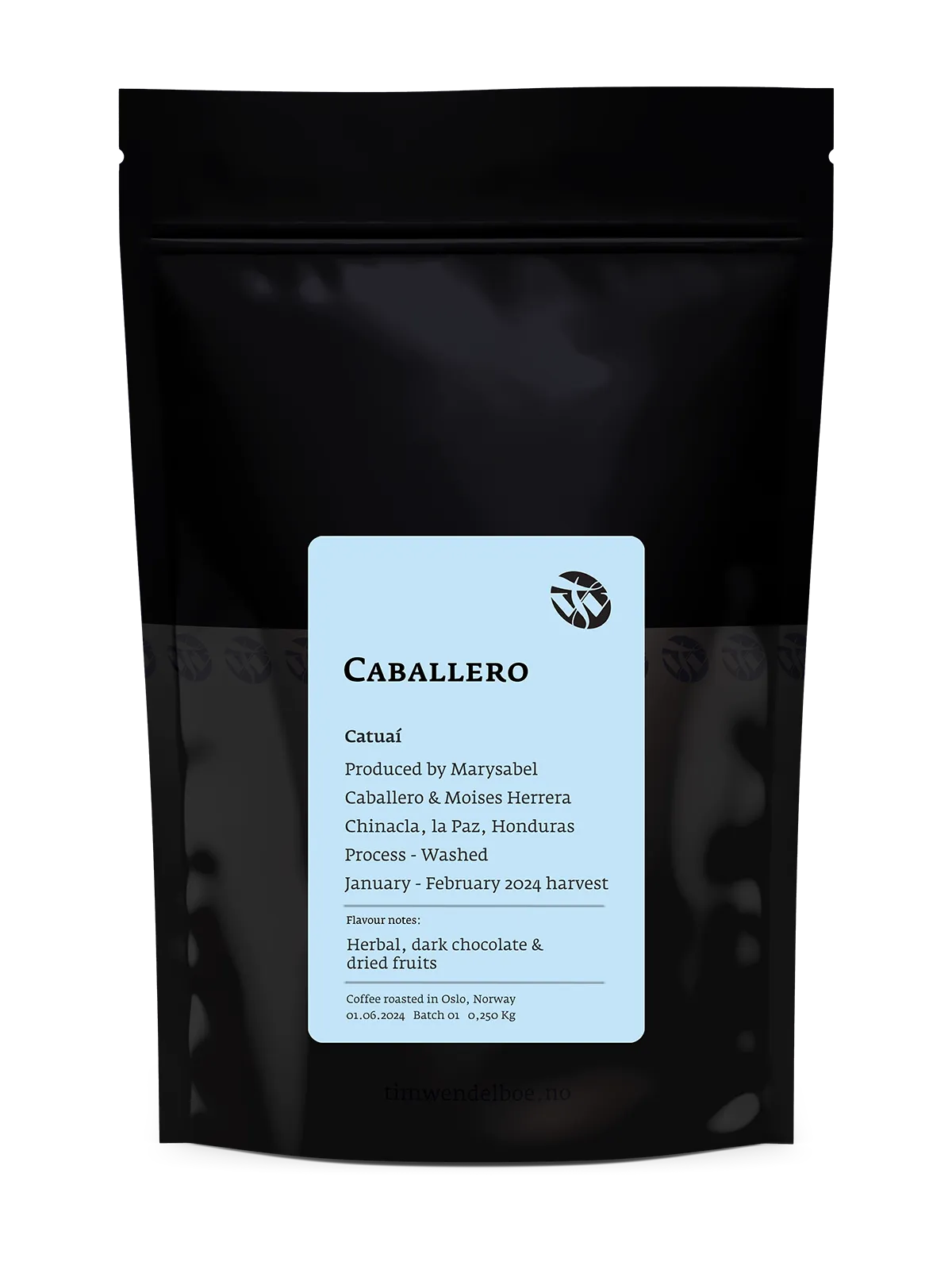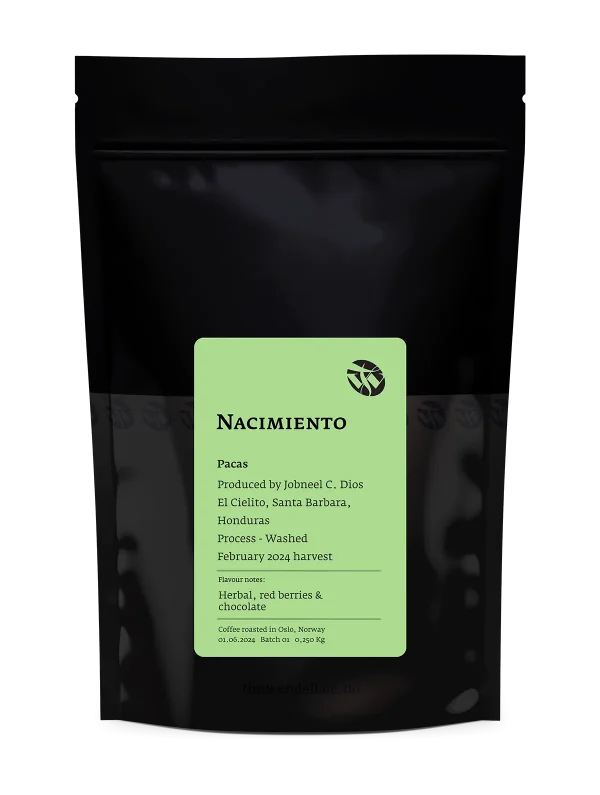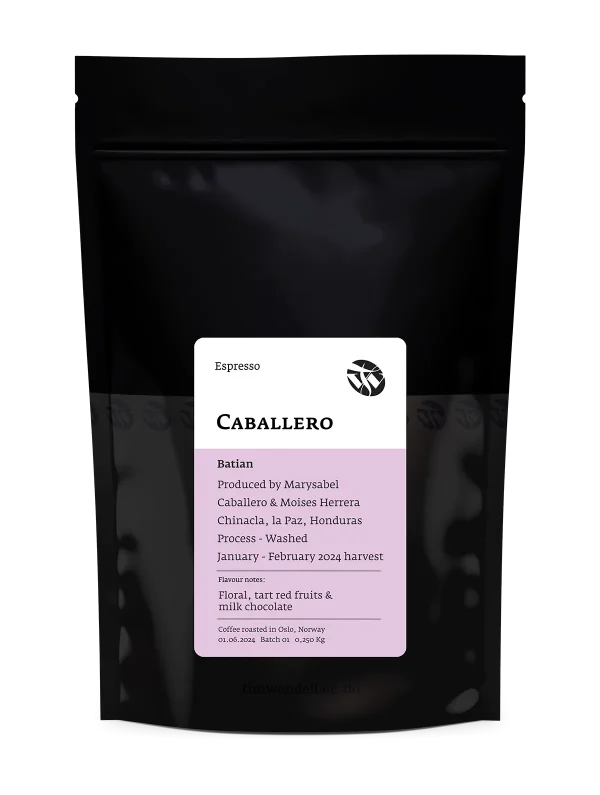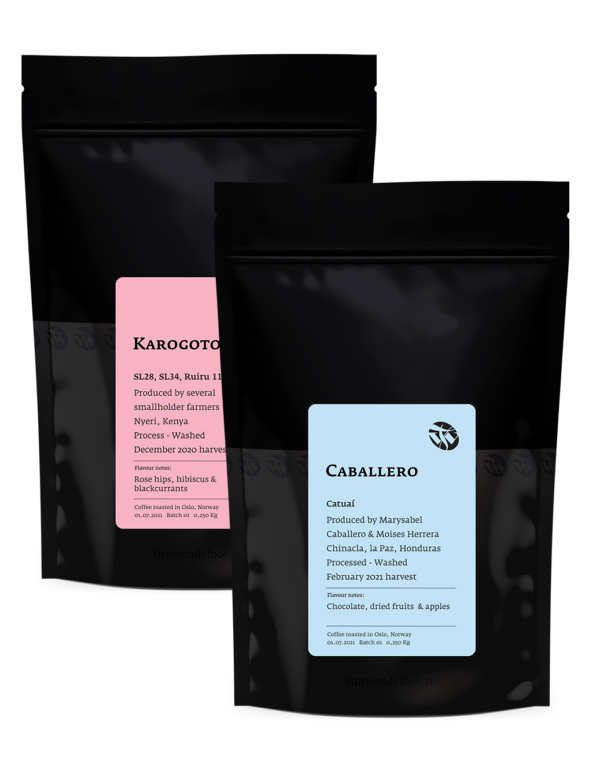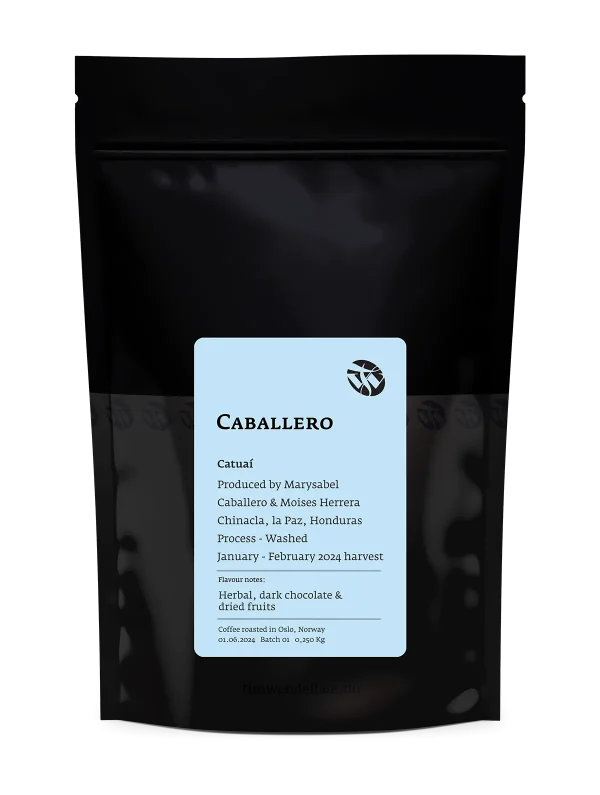| Cultivar | Catuaí |
|---|---|
| Flavour Notes | Herbal, dark chocolate & dried fruits |
| Producer | Marysabel Caballero & Moises Herrera |
| Country | Honduras |
| Region | Chinacla, La Paz |
| Process | Washed |
| Harvest | January – February 2024 |
| Roast Profile | Light Roast |
| Contents | Whole Coffee Beans |
| Bag Size | 250g |
Caballero Catuaí
kr205.00
The majority of the Caballero’s farms are planted with the Catuaí cultivar which used to be the most commonly grown cultivar in their area. Expect a rich and chocolaty coffee with subtle flavours of dried fruits and nuts with a herbal finish.
Additional information
Tim's Notes
Marysabel and Moises produce a lot of the Catuaí cultivar, but not all lots are produced the same way. Some are dried on patios and others in mechanical driers or on raised beds under shade. Since I started buying coffee from the Caballeros, I have gradually developed a protocol in cooperation with Moises and Marysabel on how to separate, process and especially dry and store the coffees we buy from them. They are now producing a lot of Catuaí coffees following these protocols that is especially separated for us to choose from.
All the lots we buy are dried on raised beds in shade and are hand sorted and milled with extreme care and attention. It really makes a difference in the final cup. In fact Moises was the one who let me experiment with shade dried coffee in the first place and we found that the green coffee will stay fresh for a longer time and taste much cleaner than the patio or mechanically dried coffees they produce. (In later years the Caballeros have adapted some of these principles and by that managed to increase the quality and shelf life of their mechanically dried coffees too.)
All the lots we buy are dried on raised beds in shade and are hand sorted and milled with extreme care and attention. It really makes a difference in the final cup. In fact Moises was the one who let me experiment with shade dried coffee in the first place and we found that the green coffee will stay fresh for a longer time and taste much cleaner than the patio or mechanically dried coffees they produce. (In later years the Caballeros have adapted some of these principles and by that managed to increase the quality and shelf life of their mechanically dried coffees too.)
Cultivar
Catuaí is a Brazilian cultivar that used to be the one of the most common cultivars planted in Honduras before leaf rust (fungus) started attacking the trees and farmers replaced their Catuaí with resistant hybrids. It is known for its sweet and chocolaty flavours and Caballero's Catuaí is a great example of this style. The majority of their farms are still planted with Catuaí because like Moises would say "it is a sweet and uncomplicated coffee that I can drink a lot of cups of every day."
Process
Picking and sorting
- Ripe cherries are hand picked by local pickers. The pickers are paid extra to sort ripe cherries from the unripe while they are picking. Sorting is done by simply putting the cherries in separate bags.
- The coffee cherries are de-pulped in the afternoon and the mucilage is partially removed from the parchment coffee with the use of a mechanical mucilage remover. Then the parchment coffee is fermented over night before the remaining mucilage is washed off with clean water in a washing channel which helps sorting floaters and undeveloped beans from the denser and more developed coffee. After washing the excess water is removed from the parchment coffee with the help of a centrifuge. Then the coffee is ready for drying.
- The coffees we buy from Marysabel and Moises are all dried slowly on raised beds covered with shade nets. These beds are set up by their house in Marcala where the climate is drier than at the wet mill which is located higher up in the mountains. During drying the coffees are raked throughout the day to ensure even drying. At night it gets covered to prevent condensation and the risk of the coffee gaining moisture in the drying process. Once the coffees are dried, they are stored in air tight grain pro bags before the they get milled and packed in vacuum packs and shipped to Norway.
Shipping
- For details on our current shipping information, please visit our FAQ page here.
- If you still have any questions, please contact us here.
How To Brew
Filter
- We strongly recommend using the correct measurements and brewing techniques when you brew our coffees. Use a digital scale both to measure water and coffee in order to get consistent results, and we recommend using between 60 to 70 grams of coffee per litre (1000g) of water, depending on the brewing method, water quality and coffee used.
- We strongly recommend using VST filter baskets. Both the 18g, 20g and the 22g basket is great for our coffee. The VST filters makes it a lot easier to extract the espresso properly which gives a lot more sweetness in the cup. They are also more or less identical to each other which makes it easy to be more consistent when brewing on several groups at the same time. You can buy the filters on our webshop, just make sure they fit your machine (ours fits all La Marzocco machines and machines with 58mm filter baskets). With the VST 18g filter basket, we recommend the following brewing parameters: 18-19g freshly-ground coffee, 25-35s brewing time, 35-38g of final brew liquid in the cup, 93°C-94°C brew water temperature.
The Caballeros
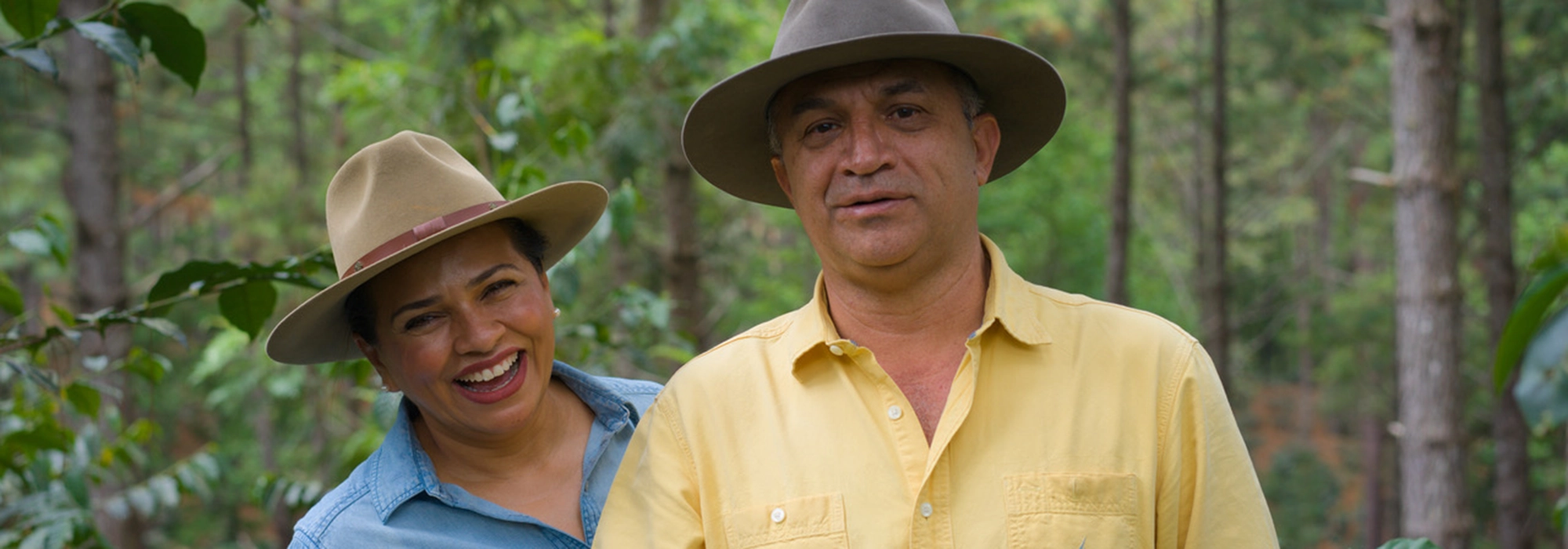
Marysabel Caballero is 3rd generation coffee farmer and together with her husband Moises Herrera they now own over 150 hectares of land planted with coffee near the town Marcala, Honduras. Marysabel’s father don Fabio Caballero is by many regarded as one of the pioneers among high quality coffee producers in Honduras. Together the family run a big wet mill where all of their coffees are processed and dried. Both Fabio, Moises and Marysabel have consistently been producing some of the best coffees Honduras has to offer. For over a decade they have been winning many top places in the Honduras Cup of Excellence. In 2016 and 2018 they managed to win 1st place with their Geisha coffees, but their first recognition was in the first Cup of Excellence competition in Honduras in 2004 when they won 2nd to 5th place with their Catuaí coffees.
Learn More About The Caballeros
Transparency
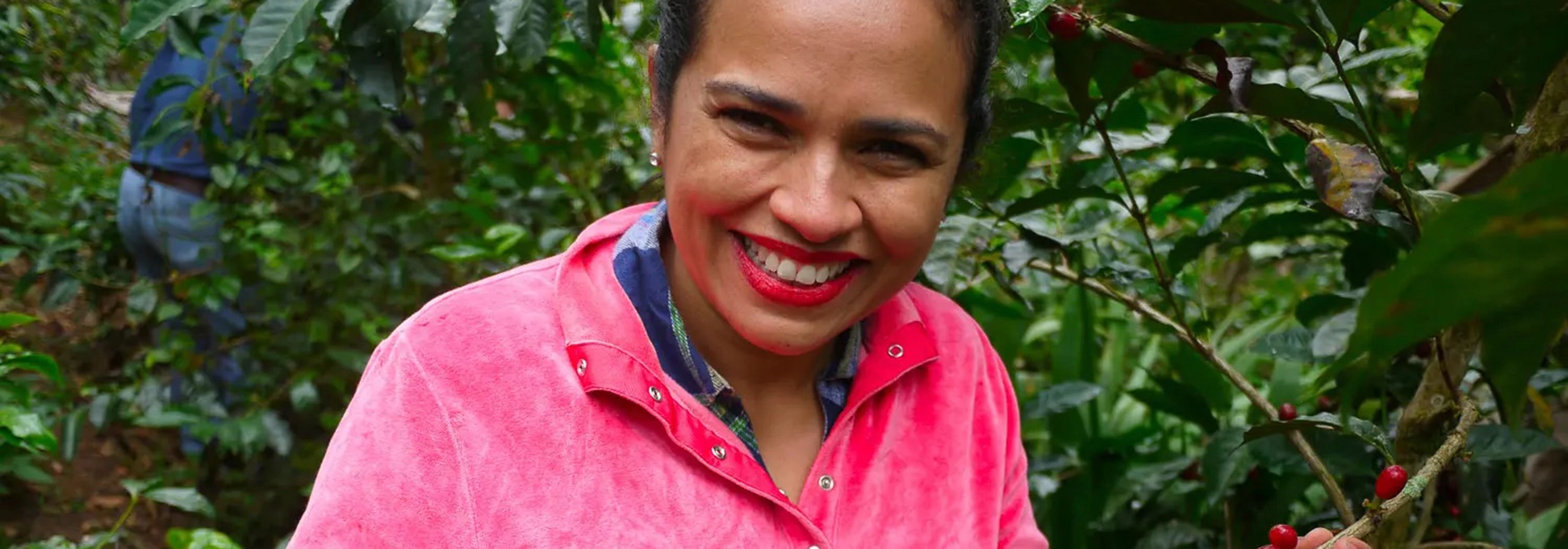
We buy coffee directly from Marysabel Caballero and Moises Herrera, the farmers. They mill and pack their own coffee. Boncafe, the exporter, provides logistical service and the coffee is imported by ourselves directly to Norway. We have been buying coffee from the Caballeros every year since 2009 and we will continue to do so in future years.
Learn More About Transparency

